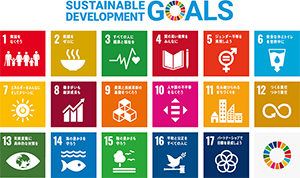ESD (Education for Sustainable Development)プログラムは、持続可能な開発Sustainable Development(SD)の教育・研究に関係する名古屋大学の6研究科(環境学・国際開発・生命農学・工学・経済学・人文学)が連携して、2013年度から実施しています。
2014年には、国連「持続可能な開発のための教育(ESD)の10年」(2005年~ 2014年)の「ESDユネスコ世界会議」が名古屋市で開催されました。2015年には国連が、2030年に向けたSustainable Development Goals(SDGs)を採択しました。ここには、あらゆる貧困を撲滅し、誰一人取り残すことなく持続可能な社会へ変革するための17のゴールと、169のターゲットがあります。
名古屋大学は学術憲章において「国際的な学術連携および留学生教育を進め、世界とりわけアジア諸国との交流に貢献する」としています。SDのリーダーとなることが期待されている名古屋大学の大学院生にとっては、リベラルアーツとしてSDの価値・知識などの基本理解・共有化が不可欠であるとともに、SDに関するDiscipline型とSolution型の研究・教育のバランスを図ることが必須となります。
各研究科に入学した大学院生(博士前期課程)は、本プログラムの必要な科目を履修でき、他の研究科での履修科目も単位認定されます。2023年度は延べ約1,160名の履修者があり、このうち、約140名が他研究科の科目を履修しました。履修に関する詳細は各研究科・専攻の履修規定を確認してください。
この「ESDプログラム」によって、SDの価値と知識を共有し、また、Solutionを見つけ出す手腕と技能を習得し、複数のSDGsを同時に目指すことができる人材が生まれることが期待されます。
SDGsの概要
Nagoya University Education for Sustainable Development Program (NU ESD Program) which relates to sustainable development (SD) education and research, was launched in 2013. Nagoya University now offers the ESD Program in collaboration with 6 Graduate Schools associated with SD, including the Graduate school of Environmental Studies, International Development, Bioagricultural Studies, Engineering, Economics and Humanities.
In 2014, the UNESCO World Conference on the UN's 10 Years of Education for Sustainable Development (ESD, 2005 - 2014) held in Nagoya. In 2015, the UN adopted the 2030 Agenda for Sustainable Development Goals (SDGs). SDGs have 17 goals which aim to end poverty, protect the planet and improve the lives and prospects of everyone, everywhere. And each goal has multiple targets, in all 169.
The Nagoya University Academic Charter states that we seek to, "Contribute to global exchange, especially with Asian countries, by promoting international academic collaboration and the education of international students". We hope our students at Nagoya University will become the leaders of a sustainable future. To fulfill this role, basic understanding and sharing of values, principles, and knowledge in SD as part of their liberal arts study is crucial. And students must balance discipline-type and solution-type research and education related to SD.
Students admitted to a master's course in any of the graduate schools (Initial Postgraduate Program) may earn up to 10 credits in other graduate schools. Approximately, 1,160 students in total join this program annually, and about 140 of them take subjects at another graduate school in AY2023. Check the graduate school or department's provisions on courses for details.
Through the NU ESD Program, it is expected that students will be acquired the value and knowledge of SD, disciplines and skills to find solutions, and ability of simultaneously achieve multiple SDGs.



